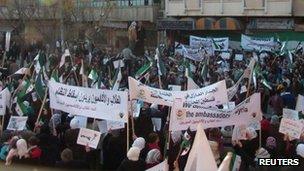Arab League sends 'serious political message' to Syria
- Published
Nabil al-Arabi says the Syrian people are paying "a very heavy price" in the current crisis
The secretary general of the Arab League has said its approval of unprecedented sanctions has sent a very serious political message to Syria.
Nabil al-Arabi told the BBC that the Syrian government could not carry on as if it was business as usual.
He said new sanctions recently agreed by Arab states would come into force on Saturday unless Syria kept its promises.
Syria's foreign minister has described the sanctions as "economic war".
In a BBC interview at the Arab League headquarters in Cairo, Mr Arabi said the Arab League had agreed to sanctions "with a heavy heart".
"We have sent a very serious political message" is how the Arab League secretary general described the sanctions.
Mr Arabi said they were a message to Damascus: "You have to behave, you have to stop what is going on, it's not business as usual. Something has to happen."
'Heavy price'
The secretary general responded to Syrian Foreign Minister Walid al-Mouallem's denunciation of the sanctions.
"No one wants to hurt the Syrian people," he insisted. "No one wants to embarrass the Syrian government."
The measures are meant to sever most trade, exchanges and investment between Syria and the Arab world.
He said the Syrian people were paying "a very heavy price" during an uprising now entering its ninth month. The UN says violence has left more than 3,500 dead.

The uprising in Syria has been going on for nine months
The secretary general would not be drawn on whether "time was running out" for President Bashar al-Assad. But he spoke of efforts over the past five months to convince him to "stop fighting, release prisoners, reform".
He said the Syrian government had a "different narrative" - that unrest was only taking place in border towns were there was foreign influence and that it was acting in self-defence.
Mr Arabi said sanctions would come into force on Saturday unless Damascus fulfilled a number of commitments, including permission for Arab League monitors to enter the country.
He recognised that past experience of international sanctions against countries like Iraq and Libya had shown they were not foolproof.
In Syria's case, neighbours like Lebanon and Iraq have abstained or dissociated themselves from the new resolutions.
But he was adamant that the Arab League could not discuss military support for the Syrian opposition. And he said all its resolutions were an effort to ensure there would be no foreign intervention in Syria.